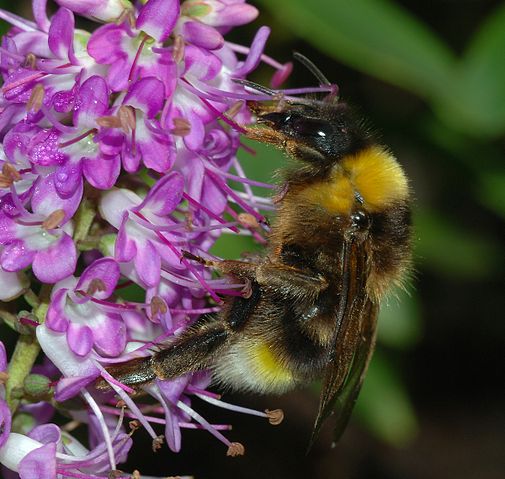
File:Bumblebee January 2008-4.jpg

Size of this preview: 505 × 479 pixels.
| |
This is a file from the Wikimedia Commons. Information from its description page there is shown below.
Commons is a freely licensed media file repository. You can help. |
Summary
| Description | A cuckoo bumblebee ( Bombus vestalis), parasite of the bumblebee Bombus terrestris. Probably a queen, due to large size |
| Date | January 2008 |
| Source | Own work |
| Author | Alvesgaspar |
Licensing
|
File usage
Metadata
This file contains additional information, probably added from the digital camera or scanner used to create or digitize it. If the file has been modified from its original state, some details may not fully reflect the modified file.
| Camera manufacturer | NIKON CORPORATION |
|---|---|
| Camera model | NIKON D80 |
| Exposure time | 1/160 sec (0.00625) |
| F-number | f/14 |
| ISO speed rating | 200 |
| Date and time of data generation | 12:55, 21 January 2008 |
| Lens focal length | 100 mm |
| Orientation | Normal |
| Horizontal resolution | 300 dpi |
| Vertical resolution | 300 dpi |
| Software used | Ver.1.01 |
| File change date and time | 12:55, 21 January 2008 |
| Y and C positioning | Co-sited |
| Exposure Program | Manual |
| Exif version | 2.21 |
| Date and time of digitizing | 12:55, 21 January 2008 |
| Image compression mode | 4 |
| Exposure bias | 0 |
| Maximum land aperture | 3.2 APEX (f/3.03) |
| Metering mode | Pattern |
| Light source | Unknown |
| Flash | Flash fired, strobe return light detected, auto mode |
| DateTime subseconds | 10 |
| DateTimeOriginal subseconds | 10 |
| DateTimeDigitized subseconds | 10 |
| Colour space | sRGB |
| Sensing method | One-chip colour area sensor |
| Custom image processing | Normal process |
| Exposure mode | Manual exposure |
| White balance | Auto white balance |
| Digital zoom ratio | 1 |
| Focal length in 35 mm film | 150 mm |
| Scene capture type | Standard |
| Contrast | Soft |
| Saturation | Normal |
| Sharpness | Normal |
| Subject distance range | Unknown |
A background to Schools Wikipedia
SOS Children's Villages chose the best bits of Wikipedia to help you learn. SOS Children works in 133 countries and territories across the globe, helps more than 62,000 children, and reaches over 2 million people in total. Why not try to find out more about sponsoring a child?

